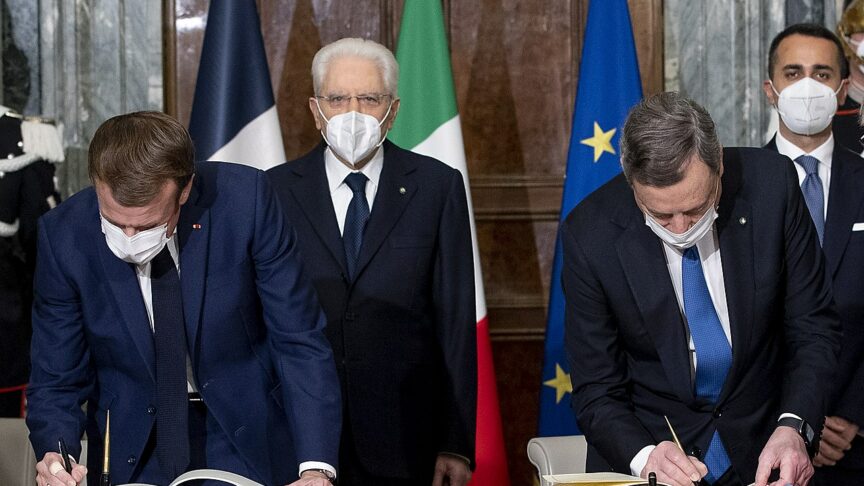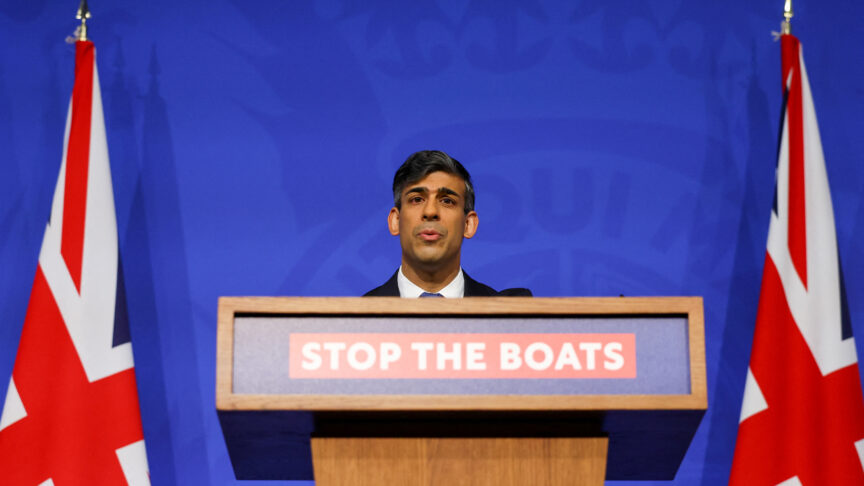The Quirinal Treaty: How France and Italy can promote environmental action and European sovereignty
More structured dialogue between France and Italy could prove useful to both countries – and to the wider European project
Last week in Rome, France and Italy signed the Quirinal Treaty. At the ceremony, French president Emmanuel Macron remarked on the anomalous absence of a Franco-Italian agreement to sit alongside the 1963 Elysée Treaty agreed between Paris and Berlin. The older document’s emphasis on defence and security was very much a product of its time. In a similar way, the Quirinal Treaty contains a particular emphasis on the environment. This focus could help the agreement prove its worth by strengthening the two countries’ and the European Union’s climate action.
The treaty’s core objective is to form a strategic alliance between Paris and Rome. It provides each side with a new political tool to help them overcome disagreements at the bilateral and European levels. Their desire to conclude a new accord may have been motivated in part by a wish to strengthen the EU’s core. Current live issues include the United Kingdom’s departure from the EU; the new government in Germany, which has a crucial role in providing leadership for the EU as a whole; and Poland’s and Hungary’s threats to the rule of law, with Polish and Hungarian Eurosceptic parties also allied to French and Italian counterparts. And Franco-Italian relations themselves have been through some difficult times in recent years. Italy’s governing Five Star Movement party issued vocal support to the gilets jaunes protests that rocked France in the early part of Macron’s term; divides remain deep between the two countries over the Libyan crisis; major opportunities have been missed, such as the touted merger of shipbuilding companies Chantiers de l’Atlantique and Fincantieri.
But with the arrival in post this year of Italian prime minister Mario Draghi, a potentially effective “Dracron” partnership emerged. It could help redefine the EU’s international role and ensure that the bloc takes action on priority issues for France and Italy. For both governments, more structured political support inside the EU would be useful – for France, with its upcoming EU presidency in January and presidential election in April; and for Italy, which needs more allies within the EU – it may have trouble securing approval from Brussels for its NextGenerationEU implementation plans. Both governments are also aware of the tough political times to come, especially when EU institutions and leaders re-enter negotiations around debt and fiscal rules when the Stability Pact (currently suspended) is renegotiated. The traditional north-south divide will inevitably come to dominate the talks.
The Quirinal Treaty’s provisions on climate policy represent a step forward in a number of ways. Bilaterally, the green agenda has always played only a minor role in relations between Paris and Rome, in comparison to other issues such as the economy, finance, and migration. But now, the treaty’s dedicated environment section envisages enhanced cooperation between France and Italy at the European level to support the EU to meet its 2050 climate neutrality goal. Through this new political cooperation framework, France and Italy could help generate support for the agreement from member states that are concerned about the economic and social effects of the green transition, Rome and Paris included. They can do so by rotating members of each government’s cabinet to their opposite number, helping coordinate and share experiences on shared priorities. Periodical joint meetings of the foreign affairs committee on particular issues would also assist in this. Both countries will want to deliver, and be seen to deliver, on NextGenerationEU-funded activities. This could be helpful for each side, as both have domestic challenges to overcome: France has to deal seriously with the place of nuclear power in its energy mix while Italy retains a strong gas dependence on neighbours that are not always the easiest to deal with.
The Quirinal accord could supplement the Elysée Treaty by being a channel to promote environmental action and strengthening the EU’s inner workings.
At the regional level, the new treaty acknowledges the close interconnection between France and Italy through the shared Mediterranean basin; here, they have committed to promote the sustainable use of energy and support green investments in North Africa and sub-Saharan Africa. At the multilateral level, they reiterate their support for the Paris Agreement and the implementation of the recently agreed COP26 pledges. And, in a sense, the Quirinal accord could even supplement the Elysée Treaty by being a channel to promote environmental action and strengthening the EU’s inner workings. If France and Germany have core security and defence interests in common, the same applies to France and Italy with regard to green objectives. The treaty can create a permanent forum of dialogue between the two states and support Europe’s promotion and defence of its strategic interests.
Pursuing the delivery of the green agenda could also help dispel any impression that the treaty’s purpose is to replace existing balances of power and alliances within the EU, especially at this critical political moment with Germany, a key partner to both countries. In fact, the new German government’s enhanced environmental agenda means it is likely to be more active on these issues, at home as well as abroad. In this sense, the treaty comes at a good time: France has made clear it wishes to place the digital agenda at the heart of its EU presidency. But Italy’s recent chairing of the G20 and COP26 co-presidency mean that enhanced dialogue with France could help amplify the case for the EU to act geopolitically at the multilateral level. In the remaining year of its COP co-presidency, Rome can work to keep international actors to the pledges they made in Glasgow.
Of course, events could upend this ambition. Snap elections in Italy are always just around the corner, and the February 2022 election of the president – who is chosen by MPs and representatives of the regions – adds an additional element of instability. Some parties in the coalition government that Draghi heads are currently pushing for him to take up the presidency, as this would bring about an early general election. Others would like him to stay as a guarantor of domestic political continuity and of the deployment of NextGenerationEU funds. Meanwhile, with the election in France in April, even if Macron is successful, the result could recast his political project and impact on his Europe policy. EU allies would probably expect Macron to remain strongly anchored to EU sovereignty as a shared objective of the 27 rather than operating as part of an inner circle of member states. But the Quirinal Treaty should enable France to do both.
Both France and Italy should ride this unique political momentum, domestically and inside the EU. Doing so could even strengthen the fortunes of each government, helping them see off the political challenges coming their way. Opportunities exist deriving from France’s EU presidency and by Draghi’s personal political standing and international recognition. The newly repaired Franco-Italian engine has the potential to integrate the Franco-German one and to tackle some of the major issues of the day, including strengthening European sovereignty and responding to the climate emergency.
This article was made possible with support from the Heinrich Böll Stiftung.
The European Council on Foreign Relations does not take collective positions. ECFR publications only represent the views of their individual authors.



